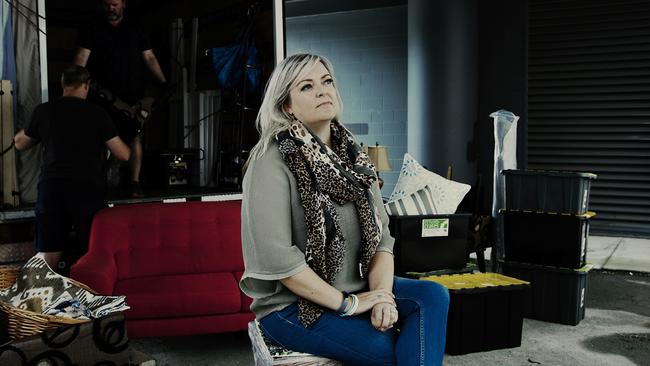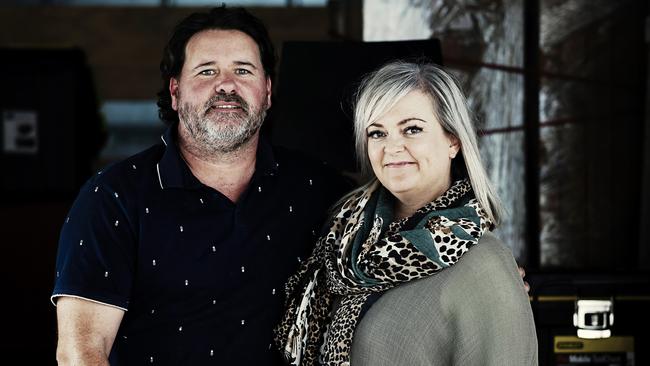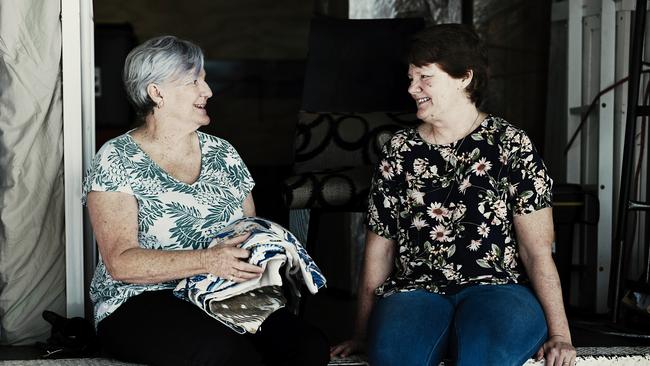How RizeUp Australia uses social media to help domestic violence survivors take refuge
Like many small modern miracles, it begins with a text message. “For f..k’s sake! Pregnant mum and three kids sleeping on a rug!”

Like many small modern miracles, it begins with a text message. “For f..k’s sake! Pregnant mum and three kids sleeping on a rug!”
Three days later, a white furniture removals truck chugs slowly through a series of traffic-calming chicanes on an ordinary Brisbane street on an ordinary morning in a bin-fire year from hell. Two Gold Coast-based South Africans in the front of the truck. Husband and wife. Hearts the size of Jo’burg. Wife rolls down the passenger window. “Told ya,” she smiles.
Nicolle Edwards did tell me and I didn’t believe her. I didn’t think it was possible. That text message landed in her phone three days ago and she told me it was from Jodie Frisch, national homes manager at RizeUp Australia, the domestic violence charity and support network Nicolle and her husband Gareth founded in 2015 that furnishes homes, free of charge, for women and families leaving domestic violence refuges across Australia. Through a domestic violence support service, the pregnant mother from Jodie’s text had secured emergency accommodation in a modest townhouse on the fringe of Brisbane, but – and there’s always a “but” in the DV support sector – the townhouse was completely empty except for a living room rug that the pregnant mother and her three kids were sleeping on.

Nicolle told me she would put a bulletin out via text and social media to a RizeUp Australia network of 578 registered volunteers and no fewer than 600,000 social media supporters. The bulletin would be simple but effective: “Hi Rizers. Pregnant mum and three kids sleeping on a rug in an empty house in Brisbane.”
She would then post her furniture wishlist. One lounge, one television and entertainment unit, one microwave, one cot, two double-bunk beds, one queen bed, bedding, linen, laundry, pantry goods. Four volunteers to help assemble furniture on the day. In three days, Nicolle promised, she and Gareth would be pulling into the driveway of the pregnant mother’s new accommodation with a truck filled with everything she will need to turn an empty shell of a house into a genuine home.
“Did it,” Nicolle shrugs from the passenger seat, as though all she’s done is accomplish some run-of-the-mill, ever-so-doable errand – posting a nephew’s Christmas present; baking a marble cake – and not just rallied an army of big-hearted strangers in order to change the future of a pregnant mother of three she’ll never meet.
Gareth pulls the truck’s rear doors open. Donated lounges and flat-packs and electronics boxes stacked to the truck’s roof. He turns to four RizeUp volunteers who have driven from four corners of Brisbane to be here this morning. “You ready to lift some furniture?”
No reason why they started all this, none beyond the perfect reason of need. Need to do something meaningful. Need to stop feeling sick in the stomach over all the dreadful numbers: three in 10 assault hospitalisations in Australia for people aged over 15 due to family and domestic violence; 183 domestic homicide victims between 2016 and 2018, according to the Australian Institute of Criminology’s National Homicide Monitoring Program; one Australian woman per week, on average, killed by a current or former partner; some 37 per cent of people seeking help from specialist homelessness services in 2018-19 experiencing domestic and family violence.
Nicolle and Gareth once worked in property. More wallet-filling than soul-nourishing, that job was. Then Nicolle had a friend of a friend in need: a mother of four who’d landed on the Gold Coast after escaping family violence. “She fled across this beautiful country from Perth and landed in my lap with nothing but a backpack, a baby and three more kids,” Nicolle says. “I put a little call out on social media, just to my little group of friends, and within a week we had all but housed her.”
Nicolle was struck by the power of social media. Look what she’d achieved through the power of six friends. Imagine what she could do with 600,000 friends. Maybe social media could be used for a good greater than cat, cake and cocktail appreciation. Nicolle remembers what her mum said when she told her she was leaving the steady world of property to start a charity that helps Australian women escaping violence with ultra-specific furniture and daily living needs. “We’ve tried to protect you from this side of life,” her mum said. “And now you’re diving headfirst into it.”
Nicolle realised her well-intentioned mum hadn’t just protected her from the reality of domestic and family violence, she’d hidden her from it. “We really need to shake it from the trees and shine a light on the beast for everybody to see it,” she says. “We need to keep our eyes firmly planted on it. We’re supporting women and children who have been displaced and relocated and are, therefore, at the greatest risk of lethality. It’s not nice. It’s ugly. But you know what, it exists.”
This is house 980. Some 979 times before this morning’s move, Nicolle’s social media network has come together to furnish homes for strangers they will never meet. Because that’s how it has to work. Mum and the kids go out for the day and the RizeUp team move the furniture in, assemble beds and entertainment units and wardrobes, and then they disappear. Never to be seen again.
“Mum’s often carrying so much trauma it would take her months to furnish a house,” Nicolle says. “They come home after we’ve left and suddenly there’s food in the cupboard, the beds are made, the furniture’s in and they’re comfortable. They can focus on starting their lives again and they don’t have to stand in the doorway giving an awkward thankyou to us about what their life is like. We already know what it means to them.”
The great pandemic only made things more meaningful. “This year we saw a marked 26 per cent increase of requests coming through to us,” Nicolle says. “There were more women than ever before in temporary motel accommodation. Domestic violence thrives in an isolated world.”
Over a 10-day period in April and a two-week period in May, the Queensland Domestic Violence Services Network surveyed more than 100 frontline support workers on the effects of Covid-19 on their world. Some 70 per cent of respondents reported an escalation of violence experienced by women. Strangulation, threats to burn down homes and burn partners and children, pressuring victims for sex and preventing partners from going to work were all identified as forms of abuse during lockdown restrictions.
“A mum in lockdown doesn’t even have the opportunity to drive the kids to school to get a break,” says Maeve, a mother of five and a long-time RizeUp volunteer who was forced to sleep in a car for 11 months after escaping her violent husband. RizeUp furnished the Brisbane rental home she lives in today with her three youngest kids. “You normally take that time driving home from school drop-off to buy a coffee, take stock, think about strategies moving forward, put a bit of distance between you and the perpetrator. You’re so fearful about going home alone when the kids aren’t there. In lockdown, you can’t even go out. You can’t escape at all.”
Maeve weeps when she recalls walking into her new home after RizeUp had furnished it. “You know that feeling you get when you come home after a weekend camping and you’re so glad to be back inside a home with electricity and running water?” she says. “Well, I felt like I was coming home after a year-long camping trip. There was a comfortable bed to sleep in. There was a toaster.”
The ability to make toast in your own home. Maeve remembers one quiet morning when she had an epiphany biting into a slice of Vegemite toast. All a human needs is stability. That’s all a home is, four walls and a door and a whole lot of stability. “Vegemite on toast,” she says, shaking her head. “It means stability.”

Gareth and his regular volunteer furniture muscle, Dean Hervey, haul two flatpack boxes of bunk beds up an internal staircase to what will be new bedrooms for the pregnant mum’s kids. In the kitchen, Nicolle fills cupboards with plates and cups, loads drawers with cutlery. She fills a pantry with canned and boxed food stuff.
“We do this for four or five families a week,” she says. “But the sad thing is we’d have to be helping 10 to 12 families a week to be properly looking after the Brisbane region alone. There’s so many mums out there right now moving about with nothing. They’re on waiting lists for homes and they’re carrying so much trauma and so much post-traumatic stress that after too long living with nothing and dragging their children through it all, they’re going back. They’re saying, ‘You know what, I’m just going to go back and I’ll just deal with whatever violence comes, as long as my kids are sleeping in their beds’. And eventually the violence erupts again and the cycle is repeated.”
In the home’s main bedroom, volunteers Helen and Natasha assemble a cot for a newborn baby they’ll never meet. They lovingly tuck white sheet corners tight under the mattress and neatly fold soft linen wraps for the baby’s mum to find in the cot when they bump back in to their home. “This is the second house I’ve worked on,” Natasha says. She’s never experienced domestic violence. “I just think everything that’s gone on with the world this year made me acutely aware of how fortunate I am. I saw all these people in really dire situations. I thought, ‘Ummm, have I ever once really known hardship? No. Could I be helping more? Yes’.”
Helen is a mother of two, aged in her 60s, whose childhood was spent briefly on the run from a violent father. “I think my father was a narcissist,” she says. “My mum wasn’t allowed to show us kids any love because my dad said that if she showed us any love then he would shoot each one of us. To prove this he would shoot one of our pets and he’d say to Mum, ‘This is what will happen if you take the children away from me and if you show any love to them’. My mum had to run and bring us up on her own with nothing. We slept on floors, just like this mum and her kids we’re helping today. Her story really hit home to me.”
Near the cot, volunteer Mandy Shaw, 65, is placing some cushions on the bed; she’s adorned the bedside tables with candles and scented soaps and almond hand creams and other pampering products. Mandy has helped furnish 160 homes for RizeUp. “This is my life,” she says. “It’s just so rewarding to walk into an empty house and by the time you walk out again, it’s a home. A home for someone who really needs it.”
More beds are hauled in; an entertainment unit, a television, a box of toys, a soccer ball, kids’ books. A couple of hours after lunch, the removals truck is empty and the empty home is full.
“You know what this is?” Nicolle says, turning her head to look at the volunteers still buzzing through the townhouse. “It’s a sigh of relief. That pregnant mum will walk in here this afternoon and breathe a sigh of relief. That’s what she’ll do.” Nicolle walks in to the dining room, stops at the newly installed dining table. “She’ll come in here tonight and sit at this table with her children and have dinner, and then they’ll hug each other and then they’ll go to sleep in their beds.”
Nicolle carefully places a welcome card on the dining table. On the card is a poem called Home. It’s the sort of earnest and soppy thing you’d find on social media, two posts beneath a video of a cat in a tutu playing Scrabble. Nicolle warns me not to read the poem in full because I’ll most assuredly cry by the time I get to the end. I don’t believe her but I read the poem to the end anyway. It’s about courage and hope and belonging and the power of community and how there’s nothing in this world that 600,000 social media friends can’t fix. By the middle passage of the poem I’m thinking of all the kind souls who came together to furnish this home and I’m feeling the muscles in my throat tense up. “This home is yours alone, created with you at heart,” the poem reads. “Furnished by the community, this is your brand new start.”
It’s not really the poem as a whole that has me welling up, it’s the two words Nicolle has thrown in at the end of it. Two simple words that feel profoundly resonant in this setting. “Welcome home.”
I discreetly drag a forefinger across my right eye. “Told ya,” Nicolle says.
RizeUp Christmas 2020 Gift Appeal: rizeup.com.au. For support, contact 1800 RESPECT


To join the conversation, please log in. Don't have an account? Register
Join the conversation, you are commenting as Logout